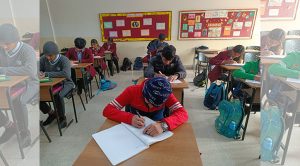How much we may say, that examination is not the true method to access one’s intelligence, but still, we have to appear in many examinations throughout our lives to prove ourselves. The importance of Examination cannot be negated. Hence, we have brought the #CBSEXAMTipsTricks Series. The hard work put in by Team MRIS VIBES to help anxious students of Manav Rachna International Schools, going to take the Board Exam in their stride is commendable. Here is a post, meticulously curated to guide students for Grade 10 English. ~Editor FROM THE EXPERT’S DESK Success is the sum of small efforts, repeated day in and day out. Robert Collier As CBSE Board Exams are approaching, students are experiencing overwhelming situations about what to study, how to study, what type of questions will be there in exams and much more. Talking about Class 10th English language and literature, it is amongst one of the highest scoring subjects. The subject focuses on the assessment of students’ conceptual understanding, analyzing, inferring, interpreting, reasoning and justifying the writer’s message. English subject plays a vital role in boosting students’ overall percentage. For better scores read the chapters thoroughly, learn the names of the characters and understand the theme and message of the prose/poetry. Section A: Reading skills (20 marks) Section B: Grammar and writing skills (20 marks) Section C: Literature Textbooks and Supplementary Reading Text (40 marks) Section A – Reading skills include two comprehension passages (20 marks) Multiple choice / Objective type questions will be asked to assess inference, analysis, interpretation, evaluation and vocabulary of the students. Section B- Grammar and Writing skills (20 marks) Students will have to attempt 10 out of 12 questions based on gap filling/ Editing / Transformation exercises to assess their spelling , punctuation and grammar. This section consists of short as well as long writing tasks. Section C- Literature Textbooks and Supplementary Reading Text (40 marks) First Flight Multiple Choice Questions / Objective Type Questions will be asked to assess inference, analysis, interpretation, evaluation and vocabulary of the students. (5 marks) Long Answer Type Questions Tips and Strategies to be followed to score high in English Language and Literature Section-by-section Study Tips The CBSE Class 10 question papers for English have four components. Depending on the degree of difficulty, each portion is divided differently. To get the most points, it would be great to answer more and more questions. Below, you’ll find English preparation advice for the English Board Exam, broken down into sections. Grammar Section: Making your fundamental ideas clear might be very helpful in the grammar portion. Utilize an excellent grammar book and regular practice. It is also necessary to analyze your responses in order to identify and rectify any errors you are making. Writing Section: Writing on current events will not only help you with this section’s grammatical mistakes, but it will also benefit you. Students should also practice techniques for time management while honing their writing abilities. Work on the formats for all topics to get the best possible grade. Reading Section: It is one of the portions of the question paper with the highest average score. With less work, students can easily achieve high marks. English Paper is a simple way to improve total percentage, yet we frequently fill our answer sheets with pointless mistakes that undermine our possibilities of doing well in the subject. However, it is a fascinating subject that gives us a chance to put our creative caps on and offer our insight on everything. Instead of being afraid of the subject, appreciate the prospects; you’ll be amazed at what you can produce. Prepare well and shine like astar. Author: Ms. Abha Mehta, TGT English, MRIS, Sec-46, Gurugram#CBSEXAMTipsTricks10th:ENGLISH



